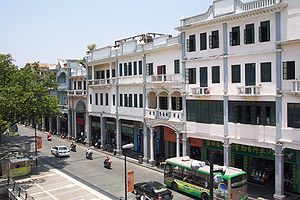 Image via Wikipedia
Image via WikipediaChina’s economy continued to power ahead last month according to the latest slew of purchasing managers index figures released on Wednesday, despite the enforced factory shutdown in southern China caused by November’s Asian Games.
The 2008 Olympics led a lot of analysts to miss the slump in the Chinese economy from the global financial crisis. With much of industry around Beijing closed down for several months during the August games in order to cleanse the air, it did not become obvious until October that the fall-off in industry was actually the result of weak demand, and not just a temporary blip created by the Olympics jamboree.
The Asian Games, which ended at the weekend with a spectacular ceremony (pictured), raise the opposite risk - that the economy is perhaps growing even more strongly than the headline figures suggest, which would be alarming given the recent surge in inflation.
As Goldman Sachs notes about the November PMI figures:
Importantly, this strong reading was achieved despite additional administrative production restrictions in the Pearl River Delta because of the Asian Games held in Guangdong Province in November.The Goldman economists point out that the restrictions on industry did not just affect Guangzhou, the provincial capital which was the host city - they also included a number of other cities in the southern manufacturing belt, “including the industrial heavyweights of Dongguan and Foshan. These two cities combined are as important as Guangzhou in terms of the size of their GDP and much more important as industrial production base.”
The figures contain other signs of rising inflation. Shen Jianguang at Mizuho says they show that:
inflationary pressure is building up, and reflect the increasing contribution in non-food prices, rather than food prices, to the rising headline CPI [consumer prices index]. We expect November CPI to reach 4.8%.However, Ben Simpfendorfer at RBS thinks that the November figures signal a turning point in the economy towards a modest slowdown. The decline in new orders for finished goods shows that industry has finished a process of restocking, which will ease pressure on prices. “Today’s developments support the call for the economy to “just” survive the current inflation risks,” he writes.




0 comments: on "China: did Asian Games hide growth?"
Post a Comment